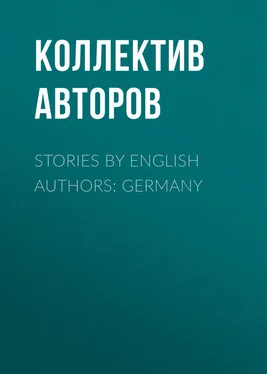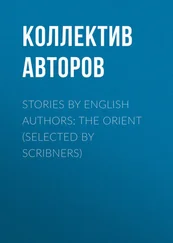Коллектив авторов - Stories by English Authors - Germany
Здесь есть возможность читать онлайн «Коллектив авторов - Stories by English Authors - Germany» — ознакомительный отрывок электронной книги совершенно бесплатно, а после прочтения отрывка купить полную версию. В некоторых случаях можно слушать аудио, скачать через торрент в формате fb2 и присутствует краткое содержание. Жанр: foreign_antique, foreign_prose, на английском языке. Описание произведения, (предисловие) а так же отзывы посетителей доступны на портале библиотеки ЛибКат.
- Название:Stories by English Authors: Germany
- Автор:
- Жанр:
- Год:неизвестен
- ISBN:нет данных
- Рейтинг книги:4 / 5. Голосов: 1
-
Избранное:Добавить в избранное
- Отзывы:
-
Ваша оценка:
- 80
- 1
- 2
- 3
- 4
- 5
Stories by English Authors: Germany: краткое содержание, описание и аннотация
Предлагаем к чтению аннотацию, описание, краткое содержание или предисловие (зависит от того, что написал сам автор книги «Stories by English Authors: Germany»). Если вы не нашли необходимую информацию о книге — напишите в комментариях, мы постараемся отыскать её.
Stories by English Authors: Germany — читать онлайн ознакомительный отрывок
Ниже представлен текст книги, разбитый по страницам. Система сохранения места последней прочитанной страницы, позволяет с удобством читать онлайн бесплатно книгу «Stories by English Authors: Germany», без необходимости каждый раз заново искать на чём Вы остановились. Поставьте закладку, и сможете в любой момент перейти на страницу, на которой закончили чтение.
Интервал:
Закладка:
She gathered herself up, rubbing elbows and knees vigorously, casting the while dark glances at the obnoxious bundle which had caused the disaster. Just then the wind was lulled, the lamp close at hand gave out a steady light, which shed its rays through the fog upon Koosje and the bundle, from which, to the girl’s horror and dismay, came a faint moan. Quickly she drew nearer, when she perceived that what she had believed to be a bundle was indeed a woman, apparently in the last stage of exhaustion.
Koosje tried to lift her; but the dead-weight was beyond her, young and strong as she was. Then the rain and the wind came on again in fiercer gusts than before; the woman’s moans grew louder and louder, and what to do Koosje knew not.
She struggled on for the few steps that lay between her and the professor’s house, and then she rang a peal which resounded through the echoing passages, bringing Dortje, the other maid, running out; after the manner of her class, imagining all sorts of terrible catastrophes had happened. She uttered a cry of relief when she perceived it was only Koosje, who, without vouchsafing any explanation, dashed past her and ran straight into the professor’s room.
“O professor!” she gasped out; but, between her efforts to remove the woman, her struggle with the elements, and her race down the passage, her breath was utterly gone.
The professor looked up from his book and his tea-tray in surprise. For a moment he thought that Koosje, his domestic treasure, had altogether taken leave of her senses; for she was streaming with water, covered with mud, and head and cap were in a state of disorder, such as neither he nor any one else had ever seen them in since the last time she had been fished out of the Nieuwe Gracht.
“What is the matter, Koosje?” he asked, regarding her gravely over his spectacles.
“There’s a woman outside – dying,” she panted, “I fell over her.”
“You had better try to get her in then,” the old gentleman said, in quite a relieved tone. “You and Dortje must bring her in. Dear, dear, poor soul! but it is a dreadful night.”
The old gentleman shivered as he spoke, and drew a little nearer to the tall white porcelain stove.
It was, as he had said a minute before, a terrible night. He could hear the wind beating about the house and rattling about the casements and moaning down the chimneys; and to think any poor soul should be out on such a night, dying ! Heaven preserve others who might be belated or houseless in any part of the world!
He fell into a fit of abstraction, – a habit not uncommon with learned men, – wondering why life should be so different with different people; why he should be in that warm, handsome room, with its soft rich hangings and carpet, with its beautiful furniture of carved wood, its pictures, and the rare china scattered here and there among the grim array of skeletons which were his delight. He wondered why he should take his tea out of costly and valuable Oriental china, sugar and cream out of antique silver, while other poor souls had no tea at all, and nothing to take it out of even if they had. He wondered why he should have a lamp under his teapot that was a very marvel of art transparencies; why he should have every luxury, and this poor creature should be dying in the street amid the wind and the rain. It was all very unequal.
It was very odd, the professor argued, leaning his back against the tall, warm stove; it was very odd indeed. He began to feel that, grand as the study of osteology undoubtedly is, he ought not to permit it to become so engrossing as to blind him to the study of the greater philosophies of life. His reverie was, however, broken by the abrupt reentrance of Koosje, who this time was a trifle less breathless than she had been before.
“We have got her into the kitchen, professor,” she announced. “She is a child – a mere baby, and so pretty! She has opened her eyes and spoken.”
“Give her some soup and wine – hot,” said the professor, without stirring.
“But won’t you come?” she asked.
The professor hesitated; he hated attending in cases of illness, though he was a properly qualified doctor and in an emergency would lay his prejudice aside.
“Or shall I run across for the good Dr. Smit?” Koosje asked. “He would come in a minute, only it is such a night!”
At that moment a fiercer gust than before rattled at the casements, and the professor laid aside his scruples.
He followed his housekeeper down the chilly, marble-flagged passage into the kitchen, where he never went for months together – a cosey enough, pleasant place, with a deep valance hanging from the mantel-shelf, with many great copper pans, bright and shining as new gold, and furniture all scrubbed to the whiteness of snow.
In an arm-chair before the opened stove sat the rescued girl – a slight, golden-haired thing, with wistful blue eyes and a frightened air. Every moment she caught her breath in a half-hysterical sob, while violent shivers shook her from head to foot.
The professor went and looked at her over his spectacles, as if she had been some curious specimen of his favourite study; but at the same time he kept at a respectful distance from her.
“Give her some soup and wine,” he said, at length, putting his hands under the tails of his long dressing-gown of flowered cashmere. “Some soup and wine – hot; and put her to bed.”
“Is she then to remain for the night?” Koosje asked, a little surprised.
“Oh, don’t send me away!” the golden-haired girl broke out, in a voice that was positively a wail, and clasping a pair of pretty, slender hands in piteous supplication.
“Where do you come from?” the old gentleman asked, much as if he expected she might suddenly jump up and bite him.
“From Beijerland, mynheer,” she answered, with a sob.
“So! Koosje, she is remarkably well dressed, is she not?” the professor said, glancing at the costly lace head-gear, the heavy gold head-piece, which lay on the table together with the great gold spiral ornaments and filigree pendants – a dazzling head of richness. He looked, too, at the girl’s white hands, at the rich, crape-laden gown, at their delicate beauty, and shower of waving golden hair, which, released from the confinement of the cap and head-piece, floated in a rich mass of glittering beauty over the pillows which his servant had placed beneath her head.
The professor was old; the professor was wholly given up to his profession, which he jokingly called his sweetheart; and, though he cut half of his acquaintances in the street through inattention and the shortness of his sight, he had eyes in his head, and upon occasions could use them. He therefore repeated the question.
“Very well dressed indeed, professor,” returned Koosje, promptly.
“And what are you doing in Utrecht – in such a plight as this, too?” he asked, still keeping at a safe distance.
“O mynheer, I am all alone in the world,” she answered, her blue misty eyes filled with tears. “I had a month ago a dear, good, kind father, but he has died, and I am indeed desolate. I always believed him rich, and to these things,” with a gesture that included her dress and the ornaments on the table, “I have ever been accustomed. Thus I ordered without consideration such clothes as I thought needful. And then I found there was nothing for me – not a hundred guilders to call my own when all was paid.”
“But what brought you to Utrecht?”
“He sent me here, mynheer. In his last illness, only of three days’ duration, he bade me gather all together and come to this city, where I was to ask for a Mevrouw Baake, his cousin.”
“Mevrouw Baake, of the Sigaren Fabrijk,” said Dortje, in an aside, to the others. “I lived servant with her before I came here.”
Читать дальшеИнтервал:
Закладка:
Похожие книги на «Stories by English Authors: Germany»
Представляем Вашему вниманию похожие книги на «Stories by English Authors: Germany» списком для выбора. Мы отобрали схожую по названию и смыслу литературу в надежде предоставить читателям больше вариантов отыскать новые, интересные, ещё непрочитанные произведения.
Обсуждение, отзывы о книге «Stories by English Authors: Germany» и просто собственные мнения читателей. Оставьте ваши комментарии, напишите, что Вы думаете о произведении, его смысле или главных героях. Укажите что конкретно понравилось, а что нет, и почему Вы так считаете.












